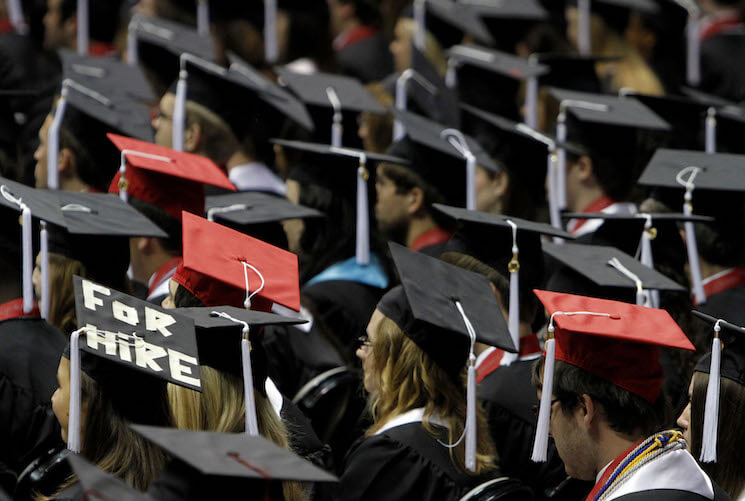Underemployment for recent U.S. college graduates

One of the many U.S. labor market concerns that economists and policymakers wrestle with is the problem of underemployed college graduates. The stereotype of the recent grad who is working as a coffee shop barista might come to mind. The worry is that while these recent graduates could get work for the time being, they might end up being stuck in this underemployed state for a considerable time. Underemployment is a significant problem for many college grads, yet it turns out the jobs they are getting aren’t exactly like those barista positions—and underemployment itself is mostly a temporary phenomenon. That’s the good news in a recent research report. The disturbing news is that the rise in such temporary underemployment for college grads may be a long-term trend.
These findings in a recent National Bureau of Economic Research working paper most immediately shed light on underemployment for recent grads in the aftermath of the Great Recession. The paper, by Jaison R. Abel and Richard Deitz of the Federal Reserve Bank of New York, looks not just at the incidence of underemployment but also the kind of jobs that college grads ended up taking. By looking at the skill requirements of different occupations compiled by the U.S. Department of Labor, Abel and Deitz categorize jobs into those that would require a college degree and those that wouldn’t. That lets them calculate how much underemployment there was from 2009 to 2013.
By looking at the wages that different occupations made during that period, the authors sort jobs into skill levels based on how much workers in those positions earned. What they find is that recent college grads were underemployed, but they nonetheless were working in jobs that still allowed for some use of their skills, at least compared to the jobs that workers of a similar age but without a degree were working in. And eventually the college grads moved up into jobs that would fully use their college education. In other words, the jobs of underemployed grads didn’t live up to the barista stereotype—the jobs were temporary stops on the way to higher paying jobs. Of course, this doesn’t mean their underemployment didn’t or won’t have a scaring effect on these workers’ future income gains. It will. But not as large as some might think.
But there’s another important angle to this story. Abel and Deitz show that underemployment was still increasing up until mid-2014, which is about five years after the end of the Great Recession. What’s more, underemployment for recent grads was increasing even before the recession started in late 2007. That means there is evidence this problem of temporary underemployment for college grads also is a long-term trend in the U.S. economy.
The co-authors point to research showing a potential decline in demand for skills since 2000 as the possible explanation. Such a reversal in demand would mean that the skills that graduates do pick up in college are less in demand than in the past. Such a trend would have big implications for how we think about higher education, the importance of full employment, and efforts to reduce inequality.

